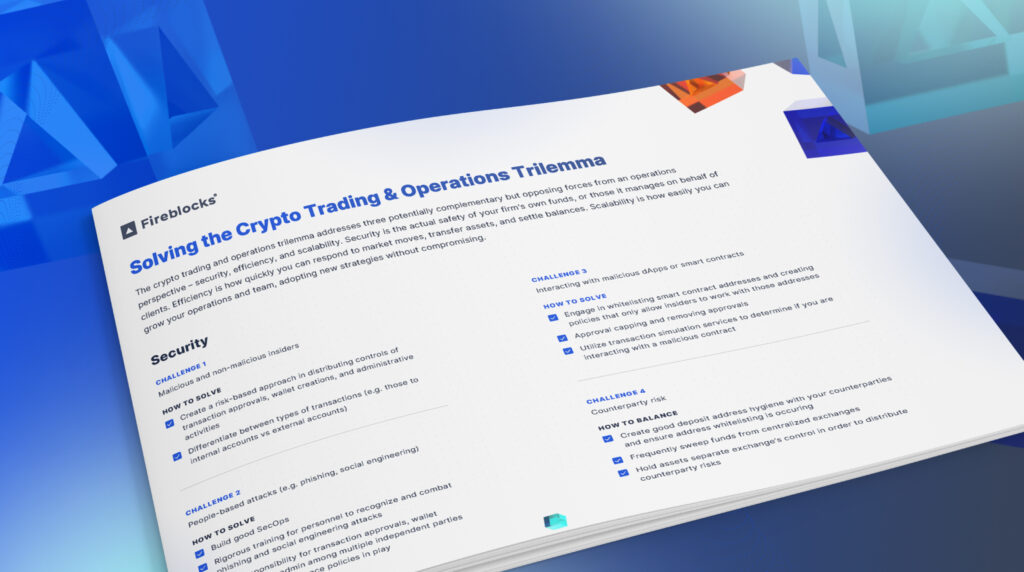The crypto trading and operations trilemma addresses three potentially complementary but opposing forces from an operations perspective – security, efficiency, and scalability. Security is the actual safety of your firm’s own funds, or those it manages on behalf of clients. Efficiency is how quickly you can respond to market moves, transfer assets, and settle balances. Scalability is how easily you can grow your operations and team, adopting new strategies without compromising.
Security
Challenge: Malicious and non-malicious insiders
How to solve
- Create a risk-based approach in distributing controls of transaction approvals, wallet creations, and administrative activities
- Differentiate between types of transactions (e.g. those to internal accounts vs external accounts)
Challenge: People-based attacks (e.g. phishing, social engineering)
How to solve
- Build good SecOps
- Rigorous training for personnel to recognize and combat phishing and social engineering attacks
- Split responsibility for transaction approvals, wallet creation, and admin among multiple independent parties with strong governance policies in play
Challenge: Interacting with malicious dApps or smart contracts
How to solve
- Engage in whitelisting smart contract addresses and creating policies that only allow insiders to work with those addresses
- Approval capping and removing approvals
- Utilize transaction simulation services to determine if you are interacting with a malicious contract
Challenge: Counterparty risk
How to balance
- Create good deposit address hygiene with your counterparties and ensure address whitelisting is occuring
- Frequently sweep funds from centralized exchanges
- Hold assets separate exchange’s control in order to distribute counterparty risks
Efficiency
Challenge: Transaction approvals and automated workflows
How to solve
- Apply automation to low-risk transaction types and amounts
- Make the approval process easy and secure with built-in redundancy
Challenge: Address management and settlement
How to solve
- Store the whitelisted deposit addresses securely
- Admin quorum for whitelisting addresses
- Automatic checks for deposit address validity
Challenge: Compliance checks
How to solve
- Integrate automated and rule-based compliance checks into operational workflows
Challenge: Seamlessly interact with smart contracts and dApps
How to solve
- Utilize transaction simulation services to determine if you are interacting with a malicious contract
Scalability
Challenge: Scaling operations as your team grows
How to solve
- Create and automate transaction approval policies, enabling governance for user permissions within the organization, the wallets each user can interact with, and maximum transaction amounts within specific time frames
- Whitelist deposit addresses to reduce manual tasks
- Choose a flexible and scalable wallet infrastructure that allows you to execute on a diverse set of strategies (e.g. CeFi and DeFi together) within a single interface and platform
- Offer programmatic options for teams looking for robust developer tooling and SDKs to enhance automation and efficiency
- Choose an easy-to-use and well-documented platform to streamline new employee onboarding
Challenge: Strategy flexibility
How to balance
- Utilize wallet infrastructure that allows easy listing of new tokens and chains
- Choose a flexible and scalable infrastructure so you can execute on multiple strategies
- Offer programmatic options for teams looking for robust developer tooling and SDKs to enhance automation and efficiency
Challenge: Adding new trading partners and venues
How to solve
- Find a platform that can provide a single pane of glass view of CeFi and DeFi operations



